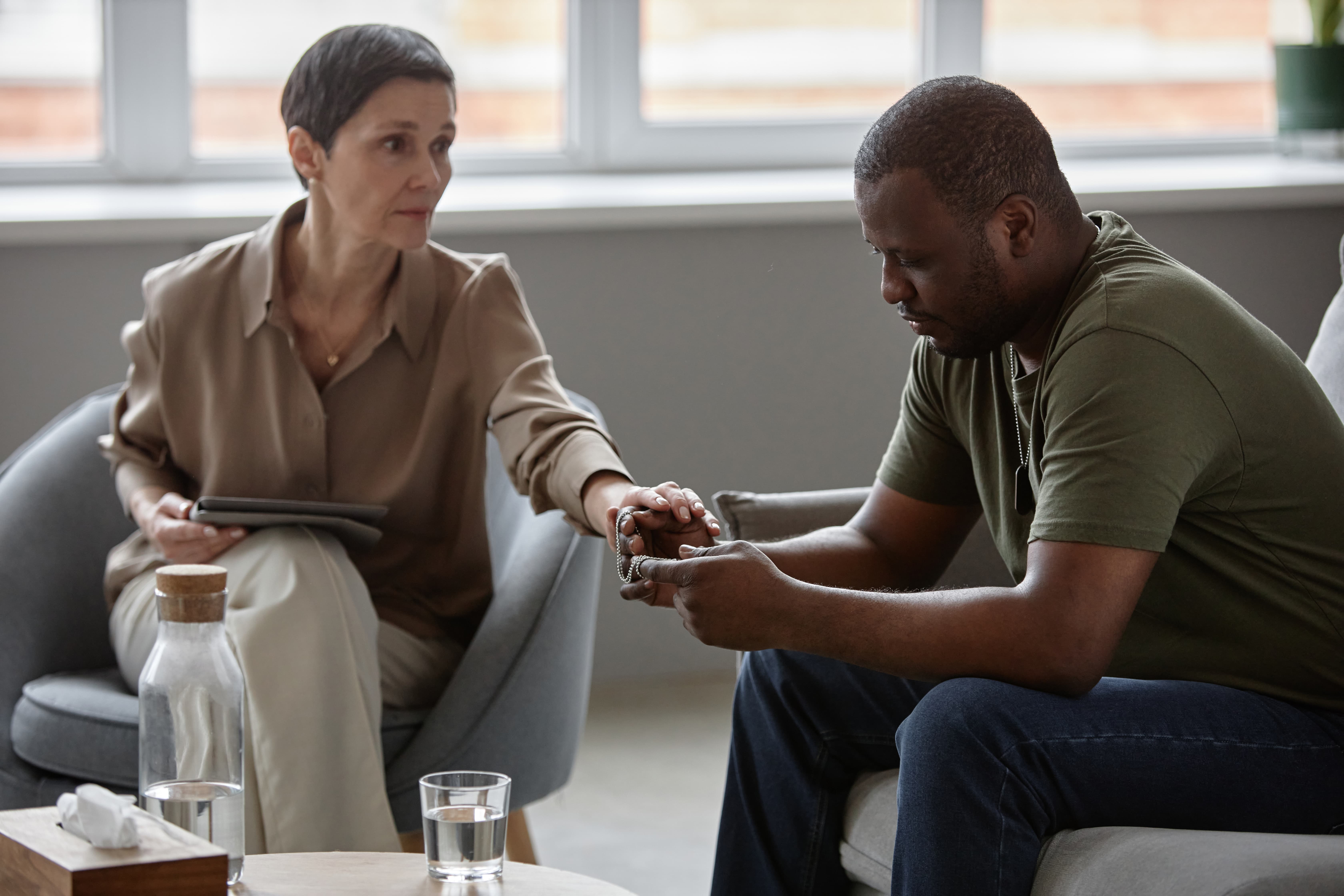According to the NHS, Cognitive-Behavioural Therapy (CBT) is among the recommended counselling techniques. Other popular techniques are mindfulness and supportive counselling.
The difference between coping and thriving often comes down to the right support. Anxiety and depression are two of the most common mental health challenges worldwide, affecting millions of people each year. In the UK alone, one in four adults experiences a mental health problem annually. These conditions can affect work, study, relationships and everyday routines.
While professional help is essential, learning about effective counselling techniques for anxiety and depression can empower both individuals and future practitioners. Counselling provides a safe, supportive space to explore feelings, develop coping strategies and take small, practical steps toward recovery. At GBS, we believe that understanding these techniques not only benefits those struggling but also inspires students to build meaningful careers through courses such as our BSc (Hons) Psychology with Counselling with Foundation Year.
Recognising anxiety symptoms
Table of Contents
- Recognising anxiety symptoms
- Understanding depression and its treatments
- Mental wellness strategies in counselling
- The role of a therapist in anxiety and depression
- Coping strategies for anxiety in young adults
- Benefits of mindfulness meditation for stress relief
- Why study counselling at GBS?
- FAQs about effective counselling techniques for anxiety and depression
Anxiety is more than just a worry. According to Mental Health UK, anxiety disorders affect about eight million people in the UK at any one time. Symptoms can include:
- Restlessness and constant tension.
- Racing thoughts or difficulty concentrating.
- Physical reactions such as sweating, rapid heartbeat or dizziness.
- Sleep disturbances or fatigue.
These symptoms may interfere with daily life. Recognising them is the first step in accessing the right support. Counselling techniques often focus on grounding exercises, cognitive reframing and structured coping strategies.
Understanding depression and its treatments
Depression goes beyond occasional sadness. It can manifest itself as:
- Persistent low mood or loss of interest in activities
- Changes in appetite or sleep
- Feelings of hopelessness or guilt
- Difficulty concentrating or making decisions
Effective depression treatment may involve counselling, medication or a combination of both. Talking therapies like Cognitive-Behavioural Therapy (CBT) are the recommended treatment for various mental health problems, including depression, anxiety, bipolar disorder and personality disorders. Counselling helps individuals identify negative thought patterns and replace them with healthier, more realistic perspectives.
Mental wellness strategies in counselling
Counsellors use a variety of techniques to support mental wellness strategies, including:
- Cognitive-Behavioural Techniques (CBT): Challenging unhelpful thoughts and replacing them with positive ones.
- Behavioural activation: Encouraging activities that bring joy or structure to daily life.
- Mindfulness and relaxation practices: Teaching clients to focus on the present and reduce stress.
- Supportive counselling: Listening, validating experiences, and providing encouragement.
Research from the British Journal of Psychiatry confirms that CBT and behavioural therapies are among the most effective evidence-based counselling strategies.
The role of a therapist in anxiety and depression
Working with a trained therapist for anxiety and depression can be life-changing. Therapists help individuals:
- Develop personalised coping strategies.
- Build resilience to manage symptoms long-term.
- Explore underlying causes of distress.
- Gain tools to rebuild confidence and improve quality of life.
For psychology students, learning how therapists apply these techniques provides valuable insight into future professional practice. The ability to listen with empathy, apply structured methods and remain supportive underpins effective counselling.
Coping strategies for anxiety in young adults
Young adults often face unique pressures, academic stress, career uncertainty and social expectations. Coping strategies for anxiety in young adults often include:
- Structured routines to reduce uncertainty.
- Breathing and grounding techniques during moments of panic.
- Time management and study skills to ease workload stress.
- Peer support groups to share experiences.
According to the National Library of Medicine, young adults report higher levels of anxiety than older age groups, highlighting the importance of early intervention. Counselling equips them with the tools to navigate these formative years more confidently.
Benefits of mindfulness meditation for stress relief
One of the most widely recognised counselling techniques for depression and anxiety is mindfulness meditation. Benefits include:
- Reduced stress and improved emotional regulation
- Better focus and concentration
- Lower risk of relapse in recurrent depression
Studies at Johns Hopkins University have found mindfulness can reduce symptoms of anxiety, depression, sleep disturbances and pain. For students, mindfulness is not just a counselling tool but also a practice that can improve their own wellbeing during study.

Why study counselling at GBS?
At GBS, studying counselling is about developing the knowledge, skills and confidence to support real people in real situations. Our BSc (Hons) Psychology with Counselling with Foundation Year is designed for students who want to understand human behaviour, learn evidence-based techniques and prepare for meaningful roles in mental health, education, social services and beyond.
The programme is structured to support students at every stage of their journey.
- During the foundation year, you will build essential academic, employability and digital skills while learning the fundamentals of psychology and counselling. This year lays the groundwork for higher-level study and helps you grow in confidence as a learner.
- As you progress through your degree, the curriculum combines theory and practice in a balanced way. In your first year, you will explore how counselling works as a therapeutic method, alongside key areas of psychology such as social and developmental psychology. You will also build professional communication skills essential for future practice.
- At Level 5, the programme takes you deeper into core areas such as biopsychology, cognitive psychology and counselling in diverse contexts. You will examine how cultural differences, social groups and unique individual characteristics influence mental health and therapeutic approaches. This stage emphasises the importance of inclusivity and equips you with practical skills to work in a variety of communities.
- By your final year, the focus shifts to independent research and applied learning. Modules on integrative approaches to counselling and contemporary issues in psychology give you the chance to engage in real-world debates. At the same time, your research project allows you to investigate an area you are passionate about. You will also reflect on career pathways in psychology and counselling, connecting your academic growth with your professional goals.
Throughout the course, you will be supported by experienced lecturers, industry-informed modules and a learning environment designed to be flexible for students with work or family commitments. The emphasis on employability runs through every stage of the degree, ensuring that by graduation, you will not only have academic knowledge but also the effective counselling techniques, problem-solving abilities, and professional behaviours needed to make an impact. GBS prepares you to do more than study counselling. We prepare you to practice it, contribute to your community and grow personally and professionally.
Disclaimer
This article is intended for educational purposes only. It provides general information about counselling techniques for anxiety and depression and is not a substitute for professional medical or psychological advice, diagnosis or treatment. If you are experiencing anxiety, depression or any mental health concern, please seek support from a qualified healthcare provider or licensed therapist. If you are in crisis, contact your GP, local NHS mental health services or an emergency helpline immediately.
FAQs about effective counselling techniques for anxiety and depression
Q1. What are the most effective counselling techniques for anxiety?
Q2. How does counselling help with depression treatment?
Counselling provides structured approaches like CBT and interpersonal therapy to help individuals reframe negative thoughts and develop coping strategies.
Q3. What skills can students learn from studying counselling techniques?
Studying counselling techniques helps students become empathic, improve their communication, develop critical thinking skills and master evidence-based therapeutic methods. These skills help prepare them for diverse psychology and counselling roles across a variety of sectors.
Q4. Can counselling techniques work for young adults with anxiety?
Yes. Techniques such as grounding exercises, mindfulness and routine-building are especially effective for young adults who are managing academic and social pressures.
Q5. What are the benefits of studying counselling at GBS?
GBS offers practical, career-focused learning, supportive teaching and courses like the BSc (Hons) Psychology with Counselling with Foundation Year that prepare graduates for meaningful careers in mental health.

 Make a call
Make a call
 Prospectus
Prospectus
 Email
Email
 Whatsapp
Whatsapp
